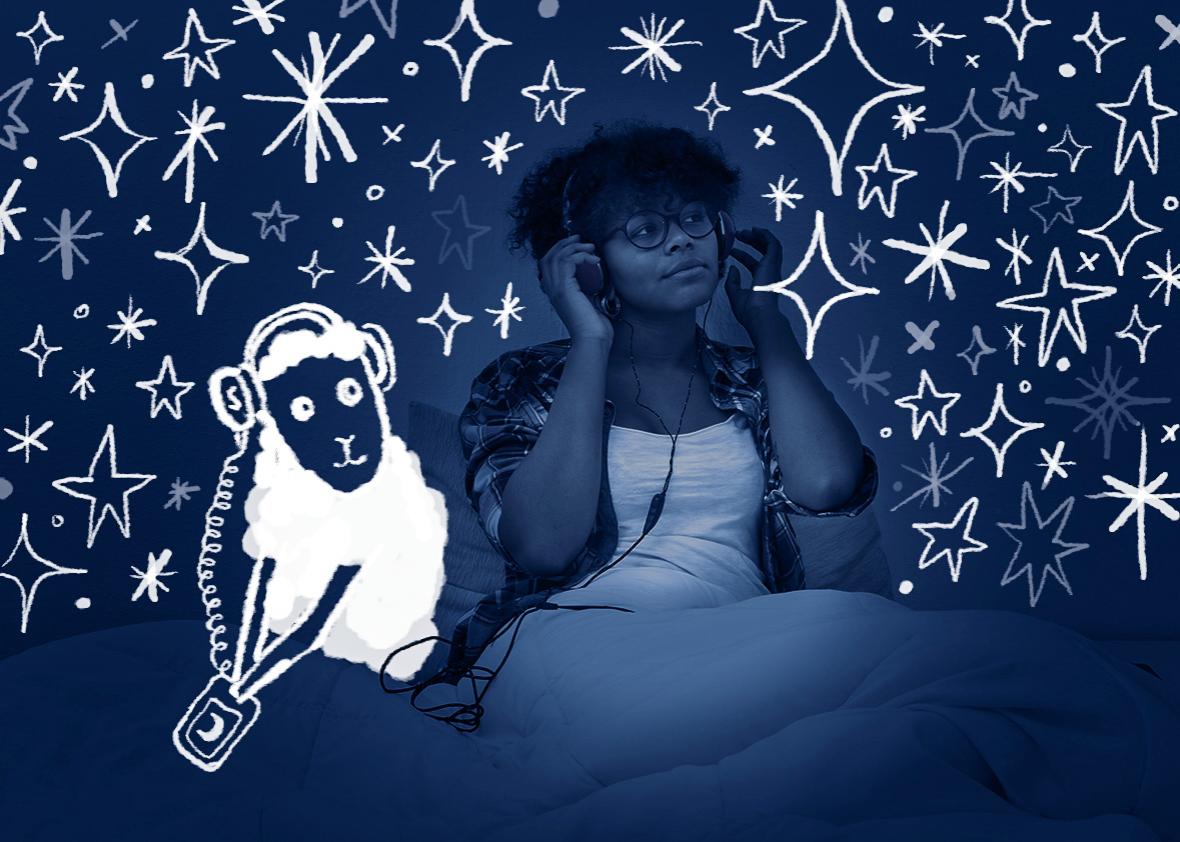“I fall asleep to your voice on my phone every night!” I once heard a guest gush to Terry Gross. At the time, I was listening to Fresh Air via the antiquated technology of radio waves and never caught his name. But the idea stuck. The audio-on-demand nature of the podcast means that smartphone owners now have a near-infinite number of ways to meet a very particular need: filling our heads with pleasant burblings as we drift loose of consciousness at the end of the day. I used to read myself to sleep, but sooner or later I’d have to reach over to turn off the bedside lamp, giving my brain just enough agitation to summon up the things I should have done that day, but didn’t—not to mention all the stuff I shouldn’t have said, but did. Better to fill every mental vacancy with someone else’s voice, as long as it can be set to switch itself off in 30 minutes.
One problem, though: Terry Gross is a great interviewer on a show that books fascinating guests. Likewise, the authors of the books that used to put me to sleep were striving for the exact opposite effect. Most culture intends to be interesting, and in an age of so many competing entertainment options, people are trying harder than ever to seize and hold my attention.
Enter the mini-industry of sleep-inducing podcasts. I don’t mean self-hypnosis, which urges the insomniac listener to relax, clear her mind, imagine some idyllic setting. Instead, a sleepcast—unlike every other pinging, flashing, animated thing on your smartphone—aims to bore.
The ruler of this drowsy kingdom is Drew Ackerman, aka Dearest Scooter, whose podcast Sleep With Me typically ranks somewhere in the Top 50 or so of the most popular subscriptions on iTunes. He also produces Game of Drones, which promises to “fight insomnia with dull recaps” of what is widely regarded as one of the most exciting TV series around. Then there’s Sleep to Strange, in which Ackerman “uses progressive boredom via silly stories to help adults fall asleep.” The titles of these stories include “Former FBLA Reporter Impeached by Model UN,” “A Little Water Globule Trembling With Joy” and “The Geeseman of Oaksterdam.”
Ackerman delivers this material in a rambling, hazy mutter that some observers have characterized as sounding “stoned.” He is very good at this, as a phalanx of five-star iTunes reviews from grateful sleepers attests. Sleep With Me always features a preamble before Ackerman launches into one of his soporific tales. The effect is a bit like being hit on the head by one of those giant mallets employed in old Warner Bros. cartoons; I have yet to make it to the actual story before conking out. Lately, Sleep With Me episodes have kicked off with Ackerman talking about the podcast’s iTunes rating, merch (you can buy T-shirts on his website), and the need for listeners to take some kind of survey. This is by far the most potent segment of the recordings. What could be more narcotic than listening to someone else’s entrepreneurial patter?
What Ackerman most sounds like is one of those unkempt, earnest guys you might have known in college, the sort who was almost always entirely sweet and you would later hear had moved into a yurt in Oregon. However, there remains the slight possibility that such a guy will go off the rails and do something truly terrible, and this keeps Sleep With Me from being the perfectly relaxing sleep aid I desire. Don’t get me wrong: It does the job. But a few times I’ve woken up again while the recording was still playing and been troubled by a nagging sense of dread. Although Sleep With Me is spectacularly boring, it is not as cozy and soothing as I would like.
There are surprisingly few alternatives, in that there are basically two, and both have hit upon a mother lode of lulling material that has, until now, gone untapped: the literary short story. Bedtime Stories: Classic Tales for Sleepy Grownups features fiction in the public domain by the likes of Anton Chekhov and Edith Wharton, but the goofy enthusiasm of narrator Parker Leventer (a yoga teacher and actress) sends too many ripples across the stories’ placid surfaces. Besides, most short stories old enough to be used for free in a podcast are dangerously entertaining; I adore Saki, for example, but laughter seldom segues into slumber.
There are insomniacs who swear by the New Yorker’s fiction podcast, in which celebrated authors read the work of other celebrated authors from the magazine’s archives. Readers beyond counting have complained about the tedium of the classic “New Yorker story”—beautifully written but maddeningly uneventful, exactly the qualities to promise a quick trip to the Land of Nod. But no matter how mild the material chosen, with the New Yorker podcast you still never know who’s going to be reading it to you. The voice might grate or whine or lapse into the unspeakably irritating singsong cadence so many writers have adopted for public readings.
At last I discovered Miette’s Bedtime Story Podcast, narrated by a rather mysterious Welsh-sounding lady who is very partial to James Joyce. This turns out to be an ideal combination. Joyce’s stories aren’t boring, but neither do they make a bid for their reader’s attention. You have to come to them, and if you only make it halfway there, you will find yourself idling in a tranquil realm where lovely sentences patter down on you like a warm, soft rain. The gentle lilt of Miette’s voice is what the babysitters of paradise sound like as they murmur their charges into dreamland.
Read more from The Drift, Slate’s pop-up blog about sleep.
